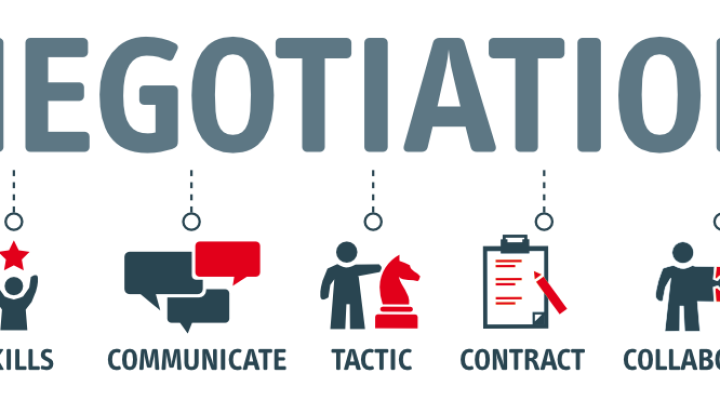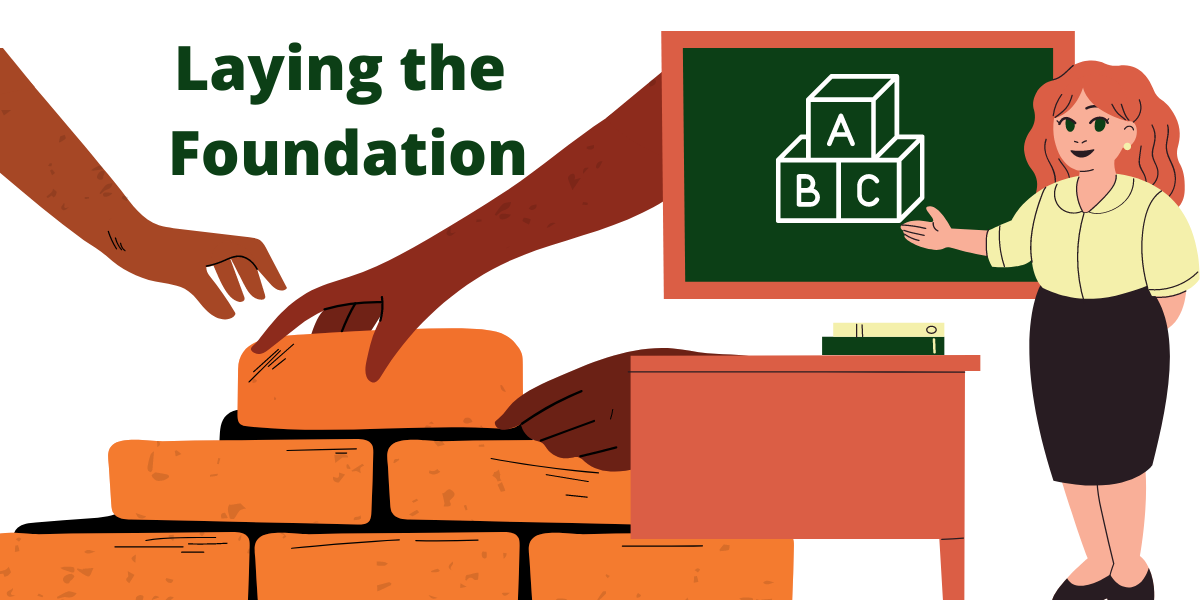Negotiation is an essential skill in both personal and business deals. Whether you are negotiating for a salary hike or promotion with your employer, finalizing a business deal, or simply making an agreement with a family member, your negotiation skills may have a huge impact on the outcome. In this article, we will discuss the art of negotiation in business deals.

Know the art of Negotiation:
Negotiation is more than a simple face to face conversation; it is about making an agreement via discourse and compromise. It is important for solving disagreements and any other concerns by making mutually beneficial agreements. Let us go down the fundamentals of negotiation.
Importance of Negotiation:
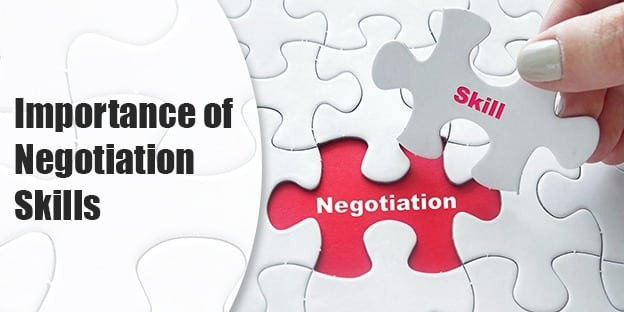
Negotiation is important for solving issues and ensuring equal justice to all the parties of the deal. It is not only about achieving what you want; it is also about building connections and encouraging each other. A successful negotiation may build more collaboration, less disagreements, and good relationships, both personally and professionally.
Types of Negotiations
Understanding the types of negotiations is crucial to have better results. There are basically two types:
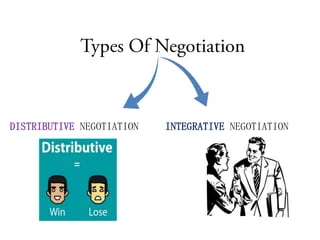
Distributive Negotiation (Win-Loss): In this scenario, one side gains while the other party loses. It’s like slicing a pie: the more one receives, the less the other gets. This negotiation is common in such situations where there is a limited resource to be distributed, such as arguing over the price of a commodity.
Integrative Negotiation (Win-Win): This is when both sides try to find solutions that are beneficial for all the parties involved.It’s about increasing the pie so that everyone receives a fair share. Such a negotiation is essential in long-term partnerships and collaborations where having a good relation is essential.
Understanding these negotiations allows you to find the best approach and strategy when you face a negotiation. Whether it is a big business deal or a simple family talk, learning how to negotiate may dramatically improve your chances of success.
Preparation for Successful Negotiation:
Preparation is the key for every successful negotiation. Without proper preparation, you might not make perfect deals as per your needs and interests. Here is the process on how to prepare for a successful negotiation.
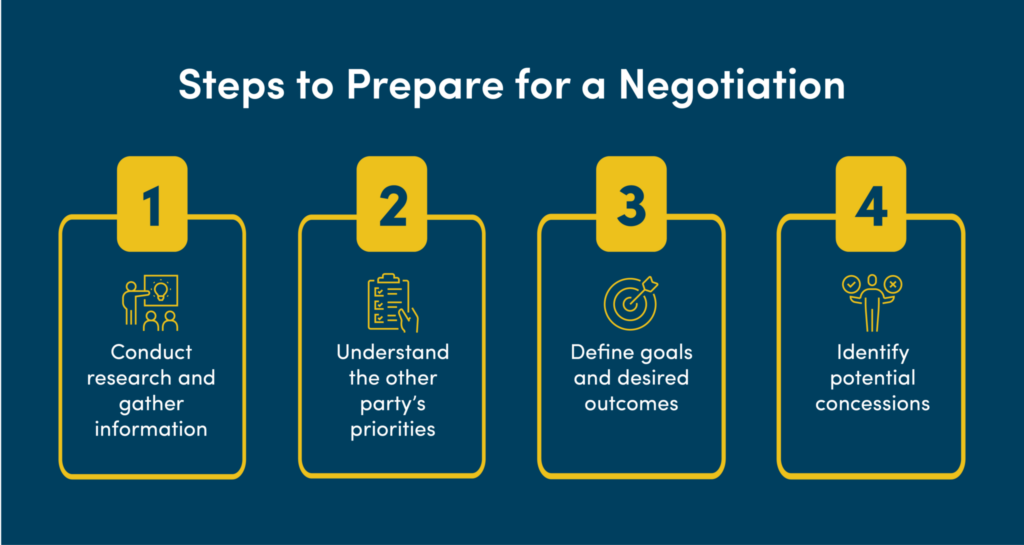
Set clear goals:
Before you start any negotiation, you should have a clear goal in mind. Make your goals and intended outcomes clear. Are you seeking a specific pay increase? Do you desire better terms for a commercial deal? Or maybe you’re attempting to mediate a family conflict? Whatever it is, having a defined goal can help guide your bargaining style and keep you focused.
Research and Information Gathering:
Knowledge about the deal is very important in negotiations. Take the time to learn about the other party’s requirements, priorities, and background. This might include studying their company objectives, negotiating history, or even personal interests. The more you know, the more you can predict their movements and discover common ground. For example, if you’re negotiating a commercial contract, understand the market standards and what the opposing side values the most. This preparedness provides a huge edge.
Know your negotiation style:
Everyone has a natural negotiating style, which might be competitive, collaborative, accommodating, or compromising. So knowing your style allows you to adjust to the particular deal.
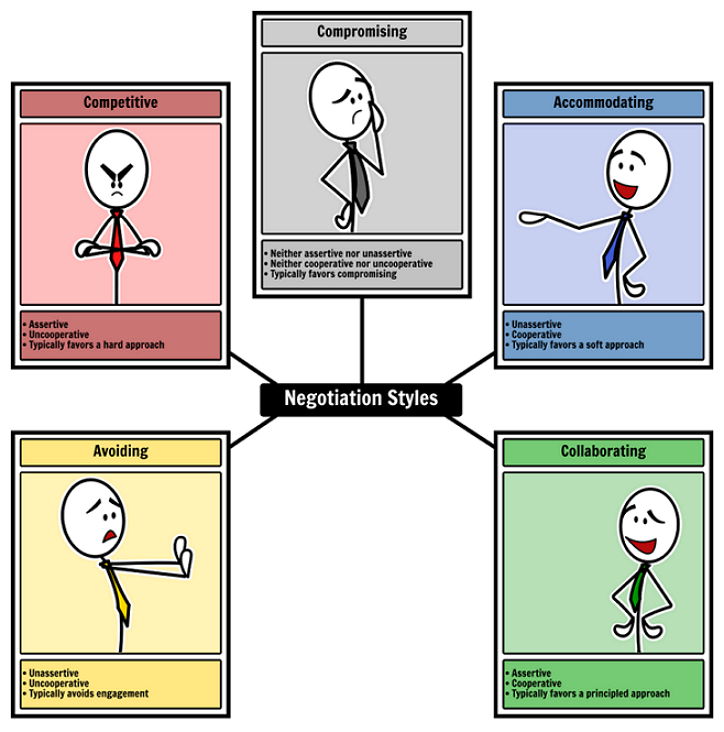
Competitive: You want to win, usually at the expense of the opposing party. This might be useful in one-time talks when you don’t have to maintain a relationship.
Collaborative: You seek win-win situations that benefit both sides. This is great for long-term partnerships.
Accommodating: You put the other party’s demands ahead of your own. This can increase goodwill, but it may not always be successful.
Compromise: You create a middle ground in which both parties give up something to make an agreement. This is beneficial when time is short and a fast solution is required.
Avoid: This style is also known as “Passive aggressive”. People who do not want to have conflicts often choose this style.
Understanding your style allows you to make negotiations more intelligently. For example, if you’re typically competitive but are negotiating with a long-term business partner, you may need to adopt a more collaborative attitude in order to maintain your partnership.
So finally, good preparation, including defining clear objectives, having accurate information, and knowing your negotiation style, are all important to success. By doing so, you are not only prepared for the negotiation, but also in a position to take the further steps to have a good outcome.
Build Strong Relationships
Building good relationships is the foundation of effective negotiation. It is not just about obtaining an agreement, but also laying the groundwork for future encounters. Here’s how you can create and sustain these important relationships:
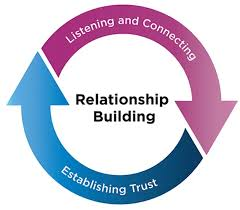
Trust and Credibility:
Trust and credibility are the foundations of all negotiations. To build trust, behave with honesty and maintain your commitments. Your behaviors should be fair and consistent, which represents your trustworthiness to the other party. For example, if you said that you will do a certain work by a specific date, make sure that you complete it on or before the given time. It takes years to build trust but can be destroyed in a second, so it is essential to be honest and straightforward during the negotiating process.
Effective communication
Effective communication is not simply talking; it is all about understanding and conveying the message clearly to other parties. Focusing on the following helps to have effective communication.
- Active Listening: Make sure to pay full attention to other people’s conversation. This demonstrates respect and allows you to grasp their wants and worries.
- Asking Questions: Do not be scared to ask clarifying questions. This not only demonstrates your interest, but it also assists in acquiring further information.
- Ensure Mutual Understanding: Make sure that both sides are on the same page. Summarize crucial ideas during conversations to avoid misconceptions.
Focusing on these qualities promotes a more open and honest discussion, which is essential for developing good partnerships.
Key Negotiation Strategies:
Implementing excellent methods can greatly improve the outcome of your discussions. Here are some important methods to consider:
Win-Win Approach:
The win-win strategy focuses on offering solutions that are beneficial to all the parties. Instead of thinking of negotiating as a problem, consider it a joint endeavor. This strategy encourages teamwork and leaves everyone happy with the outcome. For example, while establishing a commercial partnership, consider how both organizations might profit rather than focusing entirely on your own benefits.
Anchoring and Framing
Anchoring entails making the initial offer or price, which might impact the course of the discussion. For example, if you are selling a product, starting with a higher price might help create a chance for the negotiations. On the other hand, it refers to how you represent your information. The way you convey your offers and explanations might influence the other party’s views and expectations. Positive framing might help you to make your offers more attractive.
BATNA: Best Alternative to a Negotiated Agreement

Understanding your BATNA is important in every negotiation. Your BATNA is your backup plan in case the negotiation does not go as planned. Understanding your choices allows you to make better informed decisions. For example, if you’re negotiating a job offer and know you have another offer on the table, you’ll be more confident in negotiating better conditions. A strong BATNA may act as leverage, ensuring you don’t accept less than you deserve.
So successful negotiation requires solid relationships built on trust and excellent communication, as well as the use of important negotiating methods such as the win-win approach, anchoring and framing, and knowing your BATNA. Mastering these factors allows you to handle negotiations more successfully and reach mutually beneficial solutions.
Few Tips for Successful Business Negotiations
Knowing the art of negotiation may have a big influence on your business relationships, as it ensures the benefits of all the parties of the business deal. Here are some key methods and recommendations to assist you negotiate the negotiating process effectively:
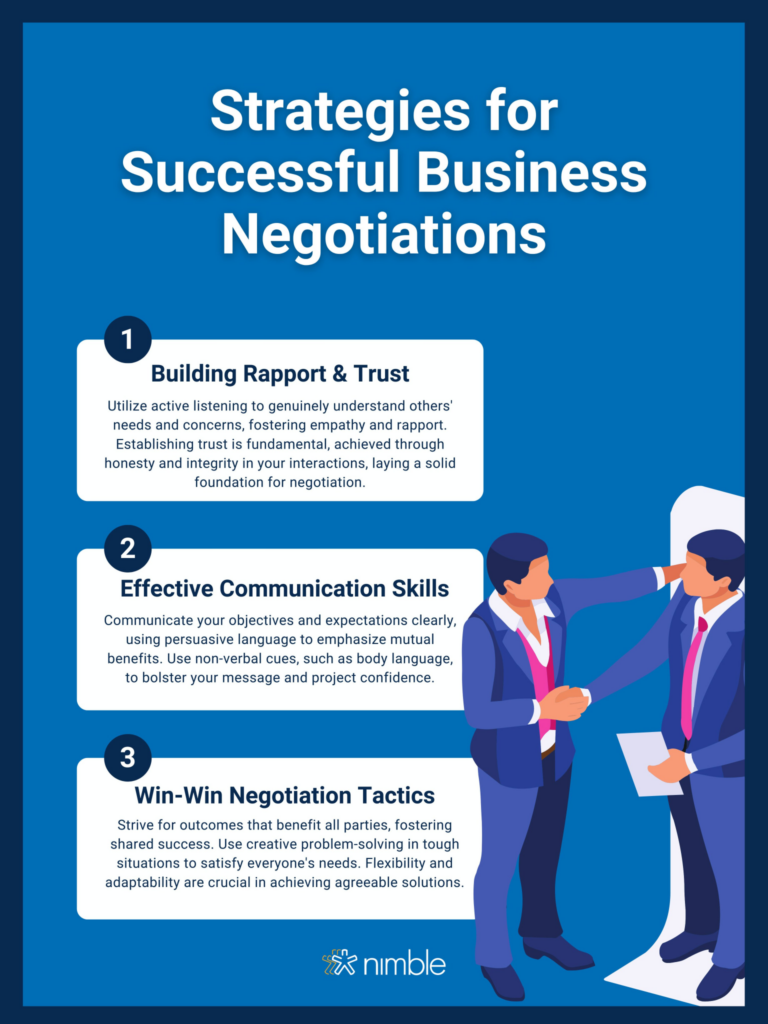
Set goals and expectations:
Setting clear goals and expectations is the cornerstone of effective negotiation. Determine your goals before beginning any discussion. Clearly convey your expectations to the other side, but also be willing to compromise. Flexibility can frequently produce greater results than rigorously adhering to your initial requests.
Develop rapport and trust:
Building rapport and trust with the opposite side is critical for a successful negotiation. Show a genuine interest in their wants and worries. Honest and straightforward communication builds trust and makes it easier to identify common ground. Remember that a positive connection now might prepare the path for more successful discussions in the future.
Active listening and effective communication:
Effective communication requires not only clear verbal communication but also active listening. Pay attention to what the other person is telling, his body language, and emotions. This allows you to comprehend their actual sentiments and requirements. Make your personal requirements clear and be receptive to input. This two-way conversation promotes mutual understanding and lays the path for developing solutions that benefit both sides.
Deal with objections and conflicts:
Negotiations often fill with objections and disagreements. So When a problem arises, take some time to understand the views and issues of both the parties. Address criticisms critically and seek to reframe situations. Seek solutions that benefit everyone concerned. This collaborative approach may transform potential impediments into possibilities for compromise and agreement.
Patience and Persistence:
Negotiations may sometimes be lengthy and difficult. It’s critical to maintain patience and persistence. Maintain focus on your goals while remaining adaptable enough to change your techniques as needed. Keep the lines of communication open and continue to interact with the other person, even if progress appears slow. Persistence usually pays off in the end.
Flexibility and adaptability:
An effective negotiator needs to be flexible and adaptable. Be open to diverse options and ready to make sacrifices when necessary. . Sometimes the best agreements result from innovative problem-solving and a willingness to adapt to changing conditions. Staying flexible increases the possibilities of achieving a mutually beneficial arrangement.
Know right time to quit:
The most important skill in negotiation is knowing the right time to quit. Before starting a discussion, you must have clear boundaries and know your own limitations. If the other party refuses to satisfy your basic needs or the agreement violates your core principles, be prepared to walk away. Sometimes, no bargain is preferable to a terrible one.
By adding these strategies and recommendations into your negotiation approach, you will improve your chances of reaching a successful agreement. Remember that great negotiation is about finding solutions that satisfy both sides while also laying the framework for future partnerships.
How to Deal with Challenges in Negotiation?
Negotiation has several problems, including dealing with difficult people and handling disagreements. Here’s how to manage challenges in negotiation.
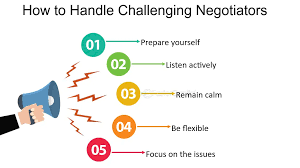
Dealing With Difficult Persons:
Stay Calm: When dealing with tough people try to be cool and avoid responding emotionally. Always maintain a professional and balanced tone.
Active Listening: By paying attention while another person is speaking, so that you may represent that you appreciate their efforts and views.
Empathize: Identify the issues of other people to reduce antagonism and open to have healthy communication.
Managing Conflict: Use Conflict-Resolution Techniques:
Identify the root cause: Understand the root causes of the problem.
Find common ground: Look for common ground to create a solution that everyone can agree on.
Reframe the problem: Present the issue in a way that emphasizes common aims.
Stay Solution-Oriented: Keep discussions focused on finding solutions.
Communicate honestly: Express your problems clearly and honestly, and encourage the other persons to do the same.
Seek third party help: If arguments get too strong, try seeking help from a neutral third party to have better negotiations.
Being cool, practicing active listening, and applying conflict resolution strategies will help you overcome negotiating problems and give good results.
End Note:
Negotiation is an essential skill that may improve your personal and professional relationships. You may produce positive outcomes and promote long-term partnerships by mastering the art of negotiating, fully preparing, developing strong connections, and employing successful techniques. Remember that good negotiation is not about winning over others, but it is about finding solutions that will be beneficial for all the parties. Use the negotiations strategies and tips given in this article to improve your negotiating skills. So that you can manage any negotiation with confidence and competence. Happy negotiation.
